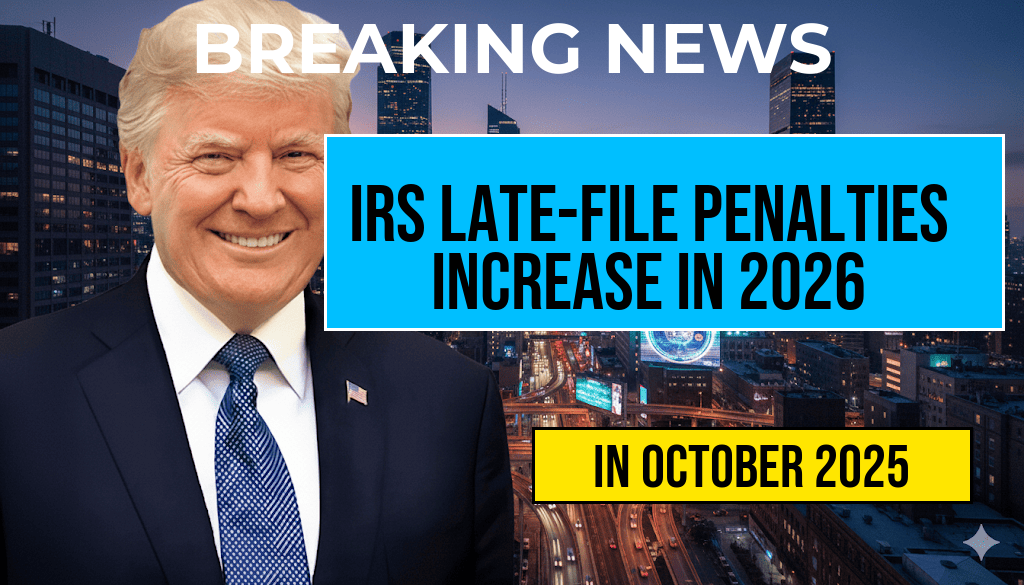As the tax landscape continues to evolve, American taxpayers are being warned about an impending increase in IRS late-file penalties, set to take effect in 2026. Currently, failing to file a tax return on time can result in a penalty of 5% of the unpaid taxes for each month the return is late, up to a maximum of 25%. However, starting in 2026, these penalties will rise significantly, potentially costing taxpayers an additional $485 if they procrastinate. This change aims to incentivize timely filing and reduce the backlog that the IRS faces, especially considering the challenges posed by the COVID-19 pandemic. With millions of individuals and businesses affected, understanding these new penalties and their implications is crucial for taxpayers across the nation.
Understanding the Current Penalty Structure
The existing framework for late-filing penalties is designed to encourage compliance among taxpayers. The current penalty structure is as follows:
| Filing Status | Penalty Rate | Maximum Penalty |
|---|---|---|
| Individual | 5% of unpaid taxes per month | 25% of unpaid taxes |
| Business | 5% of unpaid taxes per month | 25% of unpaid taxes |
Taxpayers who miss the April 15 deadline for individual returns typically face these penalties, which can accumulate quickly, especially for those with significant unpaid taxes. The intention behind these penalties is to ensure that taxpayers fulfill their obligations to the federal government in a timely manner.
Impending Changes and Increased Penalties
Starting in 2026, the IRS plans to increase these penalties, introducing a new structure that could lead to a more substantial financial burden for late filers. The proposed changes will see the late-filing penalty rise to:
| Filing Status | New Penalty Rate | Maximum Penalty |
|---|---|---|
| Individual | 10% of unpaid taxes per month | $485 or 50%, whichever is lower |
| Business | 10% of unpaid taxes per month | $485 or 50%, whichever is lower |
This increase represents a significant shift in the IRS’s approach to late filings, with the agency aiming to reduce the backlog of returns and streamline operations. For many taxpayers, this means that the cost of delaying their tax returns could rise dramatically.
Consequences of Late Filing
The consequences of late filing can extend beyond just financial penalties. Taxpayers who file after the deadline may also face:
- Interest Accumulation: Interest on unpaid taxes continues to accrue until the balance is paid in full.
- Loss of Refund: Taxpayers expecting a refund may delay their payments indefinitely, affecting their finances.
- Increased Scrutiny: Late filers may attract more scrutiny from the IRS, leading to potential audits.
Strategies for Avoiding Late-Filing Penalties
To mitigate the risk of incurring these penalties, taxpayers can take several proactive steps:
- File Early: Submitting tax returns well ahead of the deadline can prevent last-minute issues.
- Seek Professional Assistance: Consulting with tax professionals can help address complexities and ensure accurate filings.
- Utilize Extensions: If necessary, file for an extension to avoid penalties, although payment of taxes owed is still required by the original due date.
By taking these steps, taxpayers can safeguard themselves against the looming changes in IRS penalties and ensure compliance with their tax obligations.
Looking Ahead
The increase in late-filing penalties is part of a broader trend aimed at improving tax compliance across the United States. As the IRS continues to adapt to changing circumstances and challenges, taxpayers are encouraged to stay informed about potential changes and prepare accordingly. For more information on IRS penalties and tax filing, visit the IRS website or consult with a tax professional.
Understanding the new landscape of tax penalties will help taxpayers avoid unnecessary costs and ensure they remain in good standing with the IRS.
Frequently Asked Questions
What are the new IRS late-file penalties that will take effect in 2026?
The new IRS late-file penalties, which are set to increase in 2026, may reach up to $485 for each month a taxpayer fails to file their return. This change is part of the IRS’s effort to encourage timely filing and compliance.
How can I avoid the increased late-file penalties?
To avoid the increased late-file penalties, ensure that you file your tax return on time, even if you cannot pay the full amount owed. Consider filing for an extension if you need more time to prepare your return.
What should I do if I missed the tax filing deadline?
If you missed the tax filing deadline, it is crucial to file your return as soon as possible to minimize any potential penalties. The sooner you file, the less you will owe in penalties.
Are there any exceptions to the late-file penalties?
Yes, there are certain circumstances, such as natural disasters or other qualifying hardships, that may allow taxpayers to avoid late-file penalties. It’s important to check the IRS guidelines for specific eligibility criteria.
Will the penalties increase for all taxpayers in 2026?
Yes, the IRS late-file penalties are set to increase for all taxpayers in 2026, making it essential for everyone to be aware of these changes and prepare accordingly to avoid unnecessary costs.






